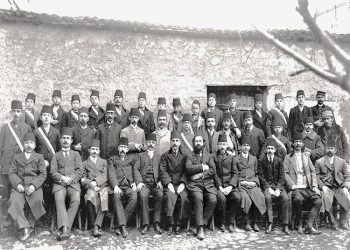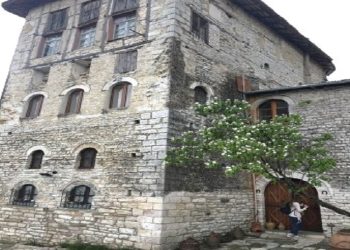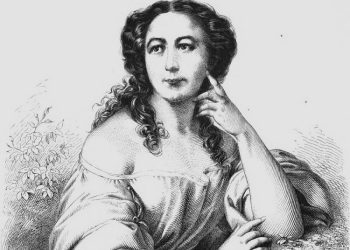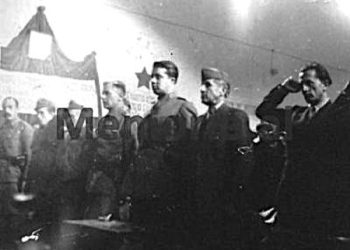Dashnor Kaloçi
Memorie.al/ publishes some unknown parts from the investigative and judicial file of the re-conviction of Pjetër Arbnori during the period he was serving his sentence in Burrel Prison in 1979, where the district prosecutor of Mat, Rexh Meta, based on the depositions of some accomplices Arbnori, as well as his interrogation by the investigator of the Internal Affairs Branch of that district, Jani Kolezi, as well as the act-expertise of the investigator Sofokli Afezolli against the manuscript books that Pjetër Arbnori secretly wrote in the cells of that prison , has filed the case in Burrell Court. All the depositions and accusations of Arbnor’s accomplices, such as JZ, B.Ç., MK, Gj.L., etc., regarding the debates and conversations they had had with him while serving his sentence, where he had spoken to them about : The October Revolution, the Cultural-Proletarian Revolution in China, Marxism-Leninism, Socialism, America, France, England, Lenin, Stalin, the senior leadership of the ALP and Enver Hoxha, the overthrow of the communist regime in Albania, etc.
“While witness B.Ç., talking about our popular power, said that: ‘These people lie in their press and newspapers’. But the fierce enmity of this defendant with our popular power is openly expressed in his desire to overthrow our popular power, saying to witness JZ, that: ‘You and your uncle will be accountable to us, for this very thing you defend this system ‘, or when you advise the witness MK, that’ Do not bow to these, we have the future, therefore you must prepare others’. From the evidence gathered in the investigative file emerges many other hostile conversations conducted by the defendant, or his ideas and views, but which together with the other material collected in the investigative file, with his attitude from the enemy to the investigator, prove not only the accusation against the defendant Pjetër Arbnori, but his being as a sworn enemy until the end of this popular power “.
This is stated, among other things, in one of the reports of the Mati district prosecutor, Rexh Meta, dated April 30, 1979, where he reports on the investigations carried out by the district’s investigation against the prisoner Pjetër Arbnori, who at that time was in Burrell Prison, where he was serving a 25-year sentence given in 1962, accused of wanting to form a Social Democratic party. What else is said about the charges against Pjetër Arbnor at the time in Burrel Prison and who were the prisoners who agreed to testify against him? What had Arbnori written in his novel “The Half-Left House” and how were the parts of that book commented by investigator Sofokli Afezolli in the act-expertise made by him which re-sentenced him for another ten years? How was the prisoner Pjetër Arbnori protected from the accusations made against him at that time and what did he write in the letters he sent from prison to the General Prosecutor, Prime Minister Mehmet Shehu, and in 1986, to Ramiz Alia? With all these archival documents that Memorie.al publishes for the first time, we met in yesterday’s issue, and in today’s article, we are publishing an interview that we conducted at that time with Mr. Pjetër Arbnori, regarding the translations made by political prisoners in the camps and prisons of the communist regime of Enver Hoxha.
Continued from the previous issue
Throughout the period of Enver Hoxha’s communist regime, a number of political prisoners serving sentences in camps and prisons, such as professors, scholars, academics, writers, translators and well-known intellectuals who spoke several foreign languages, were appointed to do so. translations of various books that were banned or were not in circulation. Part of the senior leadership of the ALP, wanted to know what was happening in the world, with history, aesthetic thought, literature, economics, politics, secret services, etc., etc. For this, among others, the extensive knowledge of Mirash Ivanaj, Mitrush Kuteli, Gjon Shllaku and many other well-known intellectuals, translators and erudites, who were obliged to translate the books needed by the high authorities, also served. of that time. Those books were not published for the general public and never went beyond the narrow circle of the ALP leadership. One of these books is The Rise and Fall of the Third Reich, by journalist and publicist William Shirer, translated while in prison by Peter Arbnor. Based on the experience of that translation, Arbnori has narrated the whole adventure of forced translation in the cells of Burrell Prison, etc.
What gender does this book belong to?
It is a documentary book: memoirs, documents, conversations, even secret conversations of greats. Anyone who reads this book learns only the reality from it.
Why do you think this book was not published at the time you translated it?
The members of the Politburo and the secretaries of the Central Committee wanted to read that book. And it should not be read by the common people or the educated. We prisoners could translate it because we were speechless. And according to their plan none of us would come out alive. Just as most people have died.
In addition to this book you have translated others in prison. Were they of this antiquity or were they literary books?
I can say that I have translated a voluminous book “World Political Economy” and “American Economy”. It was a book prepared by a group of professors at the University of Chicago that the Politburo gentlemen had taken because they wanted to know what was being said there. Even though they said that it is a worthless economy, a ruined economy that has no future, they still wanted to know about the reality of the American economy. But in addition to him, I also participated in the translation of the book “The war was won in Switzerland”, which talked about an agent who was associated with 10 or 12 German soldiers who did not like Hitler and provided him with information. of the Front and the Army! He then tried to give this information to the Americans, then to the British, and finally to the Russians. Because the data were so startling that no one believed them.
How and when did you first meet forced translation in prison?
In the spring of 1951, my sister, Antonieta, was imprisoned for the second time politically. After feeling isolated for a long time and for a short time in the big prison of Shkodra, sentenced to ten years, one day an open envelope came to our house with its new address: PRISON OF THE ENEMIES OF THE PEOPLE. CENTRAL CRAFT WORKSHOP OF THE MINISTRY OF INTERNAL AFFAIRS, TIRANA.
Did you go to meet her after the letter you received from your sister?
I went and saw a concentration camp surrounded by high walls, barbed wire and electricity, and a watchtower. “At that barred window on the second floor, the guard killed in vain Kasem Zhupa, the saboteur thrown with a parachute together with Ethem Çako”, – explained a former prisoner who was returning to get the work certificate.
- “While in the field opposite, at the ground floor house, where a marble slab can be seen, Qemal Stafa was surrounded and killed and his fiancée, Drita Kosturi, a communist of the early hours, was arrested by fascism.”
- Drita Kosturi – I intervened to sell because I know something too – has now been sentenced again to twenty years by the communist state as a “spy of imperialism”. He has now come here from Shkodra, together with my sister, and every day in front of the place where his fiancé was killed and he was arrested himself.
- “Very painful”!
- “Painful, the less you talk, the better it is for you”, the former political prisoner replied!
At the great iron gate, near a canal of stagnant water, were nailed like crosses some boards written in black: ‘ENEMIES’, ‘ORDINERS’, ‘OFFICES’, ‘CLOTHING’, ‘MESSAGING’ Near each board, sopratas and bags with hanging names were piled up waiting in line to be inserted inside the gate. ‘MESSAGE’, had fewer bags, ten or fifteen. The former prisoner told me that there were translators in that sector.
Why was that sector called Messaging?
I still do not understand why that sector was called “Messaging”, although I have checked many foreign dictionaries and as far as I am concerned, I have translated books from four foreign languages. Seven years later, when my sister was serving her second sentence, she explained to me, among other things: There were sometimes two, sometimes three translation rooms. In them were locked people among the most honored of the prisons, either by knowledge or by the position they had held. I watched them from a distance, but we were forbidden to communicate with them. The first was Mirash Ivanaj, the former Minister of Education Reform of Zog’s time. In 1945, Enver Hoxha invited him to come from exile “to help the homeland”. He called him to the office, they discussed for a long time together, they did not agree on anything and the dictator Hoxha sent the guest to prison, sentenced him, left him to die of diseases and hunger. It is proverbial that in the sign ‘MESSAGJERIA’, a bag or a sopratas with the name of Mirash Ivanaj never appeared, but it is even more proverbial, the fact that every lunch, the idealist Ivanaj, laid a clean table, a piece of bread, a plate with disgusting oatmeal, a boiled egg, never peeled, always rolled up, for months without being eaten, a piece of dry cheese that always brought it to the mouth, but never bit it, so that man would not give it anything , nor to accept a food from others. Under these conditions, the venerable professor translated for months and years, and we, the students of that time, learned dispensations prepared by him and his companions, until he breathed his last. The great writer Mitrush Kuteli also worked on ‘Mesagjeri’. There were also translated by Ali Cungu, a distinguished student of the American Technical School, Beqir Haçi, Gjon Shllaku, Homer’s translator, Vexhi Buharaja, and many others.
How did you get into the circle of these translators?
In the camps, the commissars were asked to ask: Who knew foreign languages: English, French, German, Italian, Latin, Ancient Greek or Turkish. The first language he was asked for was Russian, but none of the first prisoners knew it. Many self-taught people set out to learn it in a hurry, since in 1949 Russian became the main language of translation. Later, the problem was solved.
How was it resolved, how?
Quite simply. Many pro-Soviets were arrested after 1961, and when they were not shot as spies, they were put to work as translators in prisons. At that time the Academy of Sciences was left without specialists, the Ministry of Education was left without texts. Ministry of Foreign Affairs without translated conventions. Enthusiastic partisans could kill dozens of knowledgeable people in a minute, but they could not create trained “norm” scholars. In early 1961, I was arrested and found in camps and prisons, most of the older generation dead, spent in prison in exile, or “free” living like “zombies” who neither saw, nor heard, nor they spoke, so as not to repeat the prison which nevertheless had a reason to enter two or three times. After four years in solitary confinement and two years in a construction camp, I was transferred to Burrell Prison as disobedient and incorrigible. One day, we who were more “thin-eared” heard the command “all inside”, and the sound of clutter hurrying, and the symphony of heavy locks that were locked. As the heavy guard shoes, approaching the corridor, I looked out of the corner of my right and left eye. I took a pair of woolen socks from the underside and put them on. I put two or three handkerchiefs in my pockets. Without making a sound, I took a friend a woolen razor.
What had happened?
The door slammed and the name was called: “Pjetër Arbnori in command”! On the rise, I grabbed the cotton sweater between the mattresses that I had for every occasion. A number of senior officers were in front of me in the office. In the center, a Deputy Minister of Internal Affairs. While on the bright table, was a pile of new books, with excellent covers of foreign publications. “We have brought you to translate some of the books we need. Take it, look at it “, they told me, while I took them in my hands. “We need it quickly and with quality. You will work in separate rooms. No one should read them, neither the books nor the manuscripts. We cut it, you are punished…”, were their messages and thus I joined the circle of translators.
Were you rewarded for the forced labor you did in the dungeon?
I was told the reward that day. “You will have a ration of bread of 800 grams, a slightly better dish, you will have according to the norms from ten lek per day reward, and from two days of penalty reduction per month. Extended family meeting for 20 minutes, once a month. You will go to the bathroom whenever you need to.
Where were you ‘accommodated’ in Burrell Prison to deal with the translations the Interior Ministry staff were assigned to that job?
There were no vacant rooms in Burrel. Even the least, there were thirty people inside. Instead of rooms, we were sent to four dungeons. They put us out of a half-cut empty bitumen barrel and stove coals. The empty window was put for the first time from a glass or a cardboard box; brought from a table, two chairs, a bunch of white papers; somewhere yes, somewhere no, from a typewriter.
How many translators were there in the district where you also belonged?
We were divided into pairs. It was me and Uran Kalakulla; Engjëll Çoba, lawyer, former Deputy Minister of Internal Affairs and Xhavit Qesja, former First Secretary of the Shkodra Regional Party Committee; Vangjel Lezho, a former journalist, and Iljaz Spahiu, a former clerk at the Albanian embassy in Russia; Fehmi Frashëri is a former embassy clerk and economist in Russia, as well as Ivan Çami, a graduate engineer in the Soviet Union. All day we wrote incessantly in the dungeons, at night we went to sleep in our rooms; we each did the ventilation at the appointed time with our own room. The problem was that the guards were reluctant to meet us with other chambers, especially us “spies” in the West with “anti-party” convicts, or as they were otherwise called “middlemen” or “revisionists”.
What were the first books you brought to translate?
At first, they brought us some books. It was “Colonel Penkovsky Diary” – a Soviet intelligence colonel who volunteered for the British Intelligence Service and the US CIA during the Berlin crisis and the Cuban Missile Crisis, which provided over 5,000 original documents and information. Soviet secrets during the years 1959-1962. This book was translated by me and Uran Kalakulla. It was also the “Partisan War in the Balkans”. Secret documents on relations and talks Tito-Churchill, Tito-Stalin. Yugoslav Communist Relations – Albanian and Greek. This was translated by Engjëll Çoba and Xhavit Qesja. While Vangjel Lezho and Ivan Çani, translated “Book on the CIA, human and scientific techniques”. I also translated at that time the book “The war was won in Switzerland 1939-1945” and “French counterintelligence”
And finally, what does it mean to translate by order?
Ordinal translation does not have the pleasure of spontaneous translation, but remember, we had forbidden good books. And when they brought us to translate some such books for someone else, (which we translated for ten old lekë a day) it was contemptuous. /Memorie.al












